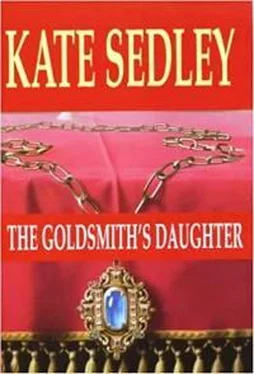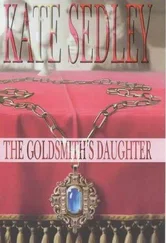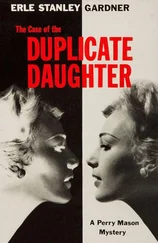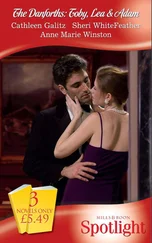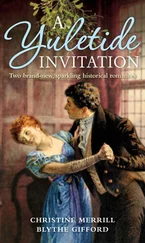‘I don’t know what’s in it, friend. I’m not allowed to know. My goody makes it, and the secret’s been in her family for generations, handed down from mother to daughter. But it sells well, which is the most important thing as far as I’m concerned.’
I was elbowed aside by other customers returning for second cupfuls, and I made my way back to Adela, who had now been joined by the Lampreys.
‘We’ve come to say goodbye,’ Jeanne said, stooping to kiss my wife’s cheek. ‘We must get back to the shop and I’ve had enough of men playing at being warlords. Adela, my dear, we shan’t see you again as you’re off home tomorrow. I hope you have a safe journey with only this Jack Nym, or whatever his name is, for company.’ She raised her head and stared at me accusingly. ‘I suppose we might see you, Roger, as you’re remaining in London on the Duke of Gloucester’s business.’
It was only later that I pieced together what she had been saying because, at the time, I was like a man in a dream. For no apparent reason, I had just recalled a remark made earlier by Adela, and this had inspired a train of thought concerning Gideon Bonifant’s murder that had absorbed my whole attention. All at once, it was as though a candle had been lit in a darkened room: suddenly, I could begin to see my way forward.
Philip, ever sensitive to an atmosphere of female disapproval, pressed my hand in sympathy as we took our farewells, but it was a gesture whose significance was lost on me at that particular moment.
‘You’re very quiet,’ Adela remarked, as we made our way back to the Voyager. ‘Do you regret not going home with me tomorrow?’
Most ungallantly, I shook my head. ‘No, I trust Jack Nym.’ I was scarcely conscious of what I was saying. ‘My love,’ I went on, putting an arm about her shoulders as we pushed against a strengthening wind, ‘I must leave you at the inn and go on to Crosby Place. I need to borrow a horse from His Grace’s stables.’
‘A horse?’ Adela stopped in the middle of the Strand, forcing me to do likewise. She knew that I was a poor rider and was puzzled. ‘Why do you want to borrow a horse?’
‘I have to go to Southampton,’ I answered, urging her forward. ‘If I walk, it will take me over a week to get there and the same amount of time to return. On horseback, each journey can be accomplished in two or three days.’
‘But why do you have to go to Southampton at all?’ my wife demanded, none too pleased by this unexpected development in my plans.
I couldn’t explain until I was more certain of my ground.
‘It’s where Gideon came from,’ I said feebly. ‘He lived there before he moved to London, after his first wife died.’
Adela glanced doubtfully at me, but she was wise enough not to ask any more questions. I guessed that her anxiety stemmed from her concern that something might happen to me during my travels, and I hastened to reassure her.
‘Don’t worry, sweetheart. I’m in no danger. I know that now.’
She made no further comment, but her sleep that night was broken, and I suspected that my words had been of little comfort to her. With the coming of daylight, she was no less preoccupied, and said almost nothing as we made for the Leadenhall, our box loaded on to a handcart pushed by one of Reynold Makepeace’s cellarmen. (I had extracted my few belongings from the box earlier and stuffed them into a canvas sack lent to me by our ever-accommodating host.)
Jack Nym was before us, and, at first, viewed my intention to remain behind with even greater disapproval than that shown by Jeanne Lamprey. But once he understood my reasons, and that no less a person than the King’s brother was involved in my decision, he changed his tune, assuring me that he would take every care of Adela, and that not the smallest risk would be taken that might endanger her health.
‘Trust me, Roger!’ he exclaimed, clapping me on the shoulder. ‘Trust me!’
I told him that I did, embraced Adela passionately, helped her mount to sit beside Jack, and watched the cart until it was out of sight, lost among the noonday crowds as it crawled towards the New Gate, the village of Holborn and the open countryside beyond. Then I went back to the Voyager, where I paid our shot, saddled the horse lent to me from the Crosby Place stables the previous day, settled the canvas sack containing my belongings on my back, where it felt instantly at home, and set out, crossing to Southwark by London Bridge before turning the roan’s head in a south-westerly direction.
My late start on Friday, coupled with the fact that I rested myself and the horse for the whole of Sunday at a wayside inn somewhere between Farnham and Winchester, meant that I did not reach Southampton until Monday afternoon.
I entered through the squalid suburbs of Orchard Lane, and, inside the walls, the perilous state of the streets had not altered since I was last in the town three years previously. My mount stumbled frequently over the broken paving stones and potholes in the road. There was the usual number of foreign sailors wandering aimlessly about (the babel of different tongues making me suddenly homesick for the Bristol Backs), while the shopkeepers and stallholders vied for their custom.
From East Street, I turned south, carefully studying the gabled ends of the houses that faced on to High Street, the small courtyards to the side and rear of each dwelling forming narrow alleyways between them. When I saw the public latrine, I knew I was nearing my journey’s end, although my nose had warned me of the fact sometime earlier. The scents of newly baked pies and pasties, boiled ham, braised beef and roast fowl had been assailing my nostrils for several minutes past. I directed my tired horse along the little passageway that separated the latrine from the neighbouring building, to where, some twenty paces in, and set at right angles to the other houses, stood John Gentle’s butcher’s shop.
Master Gentle himself, in spite of the coldness of the day, had set out his wares on a large trestle table in front of his booth, and was directing the purchase of a leg of mutton by a respectable dame who, I guessed, was housekeeper to one of the local gentry. Time somersaulted backwards and it was once again the summer of the English invasion of France, that invasion which ended in the humiliation of our troops and a fat annual French pension in King Edward’s pocket.
I had no idea if Master Gentle would remember me but, as soon as he glanced up, the round, weather-beaten face split into a welcoming grin and the hazel eyes twinkled.
‘Well, well! Roger Chapman, as I live and breathe.’ He eyed my horse and grimaced. ‘You’ve come up in the world since last I saw you. It used to be Shank’s mare for you.’ He turned his head, yelling for his wife. ‘Alice! Come and see who’s here!’
Mistress Gentle, as small as her husband was large, appeared round the side of the booth from the cottage at the rear, her mild brown eyes blinking in puzzlement.
‘What is it, John? What’s the matter?’ Then her glance alighted on me and her delicate features were instantly creased with pleasure. ‘Master Chapman, come in! Come in!’
I had to excuse myself for a time while I located the nearest livery stable and made sure that the Duke’s horse would be looked after for the night, or for as long as it was necessary for me to remain in Southampton. Then I returned to the Gentles’ shop. The customer had gone and no other had as yet arrived to demand the butcher’s attention, so he and his wife were both waiting for me in the cottage kitchen, where a bright fire burned and a pan of stew was warming amongst the flames.
We spent the next hour catching up on one another’s news, Master Gentle having routed out a neighbour’s son, who, for a consideration, was willing to watch over the stall and booth and shout for John whenever he was needed. So it was they learned that I had married again, had a stepson as well as a daughter, with a third child on the way. They also learned that I was at present on an errand for the Duke of Gloucester, which intrigued them, but without eliciting a torrent of prying questions. They were a discreet couple, content with such snippets of information as came their way.
Читать дальше
